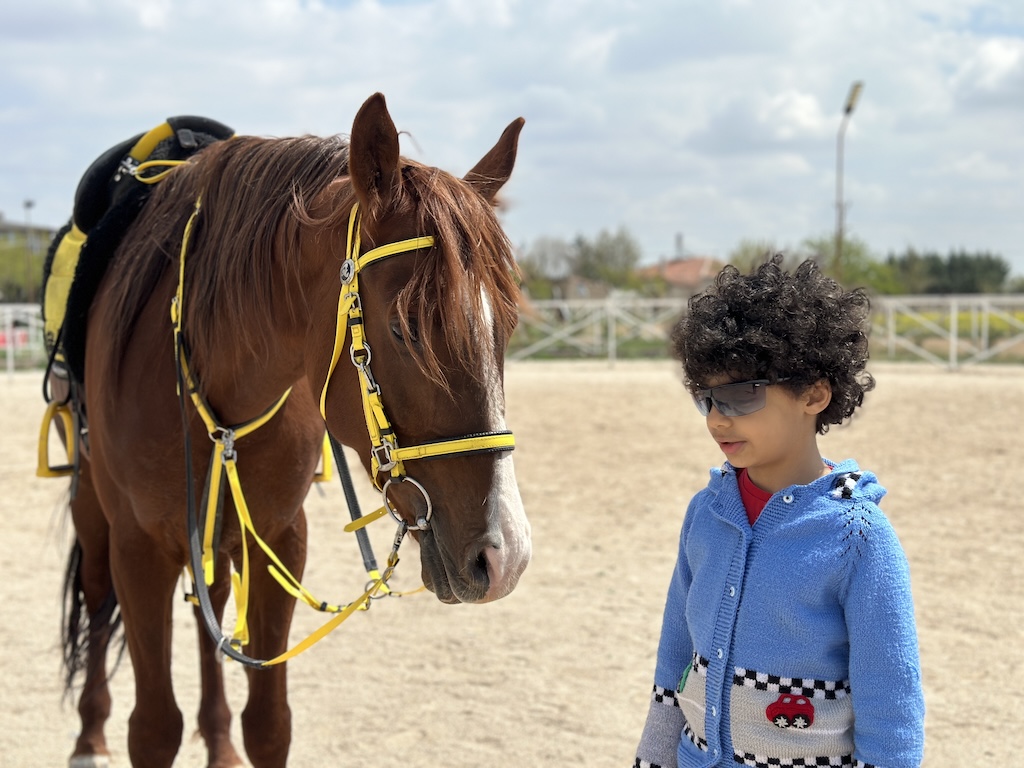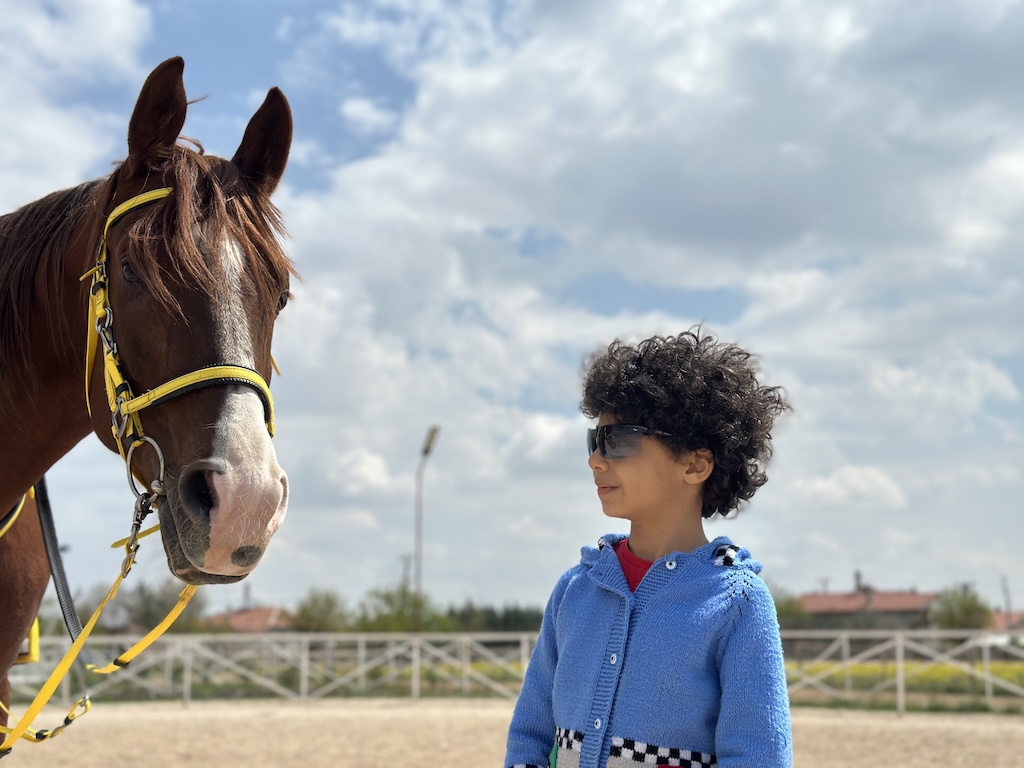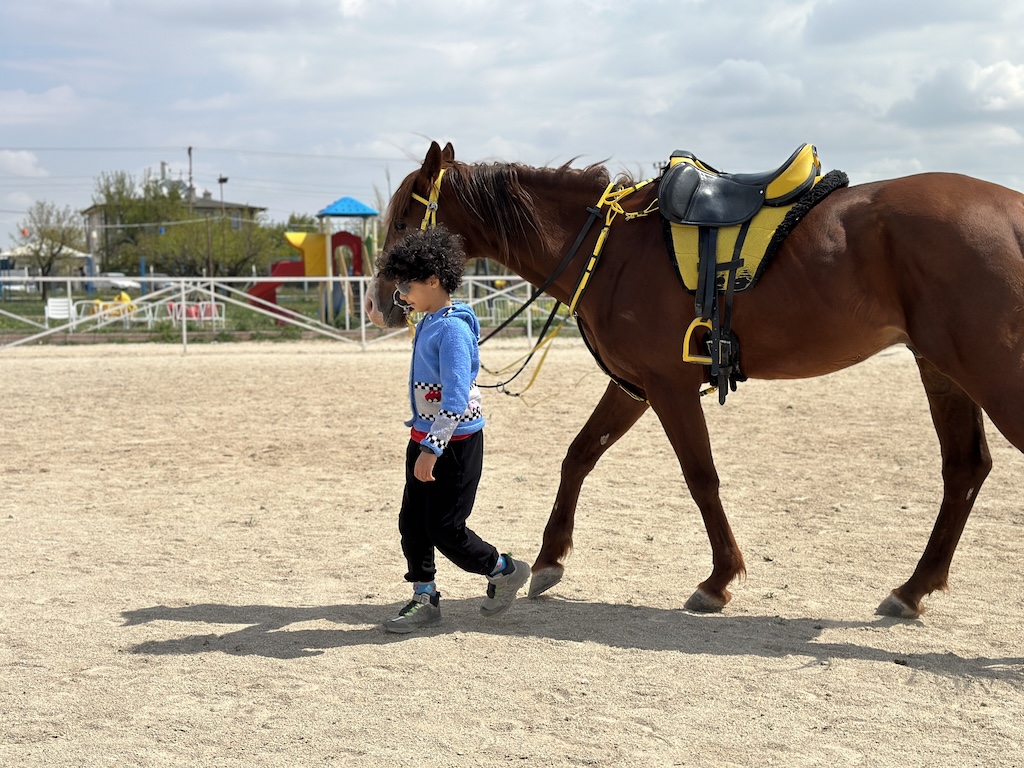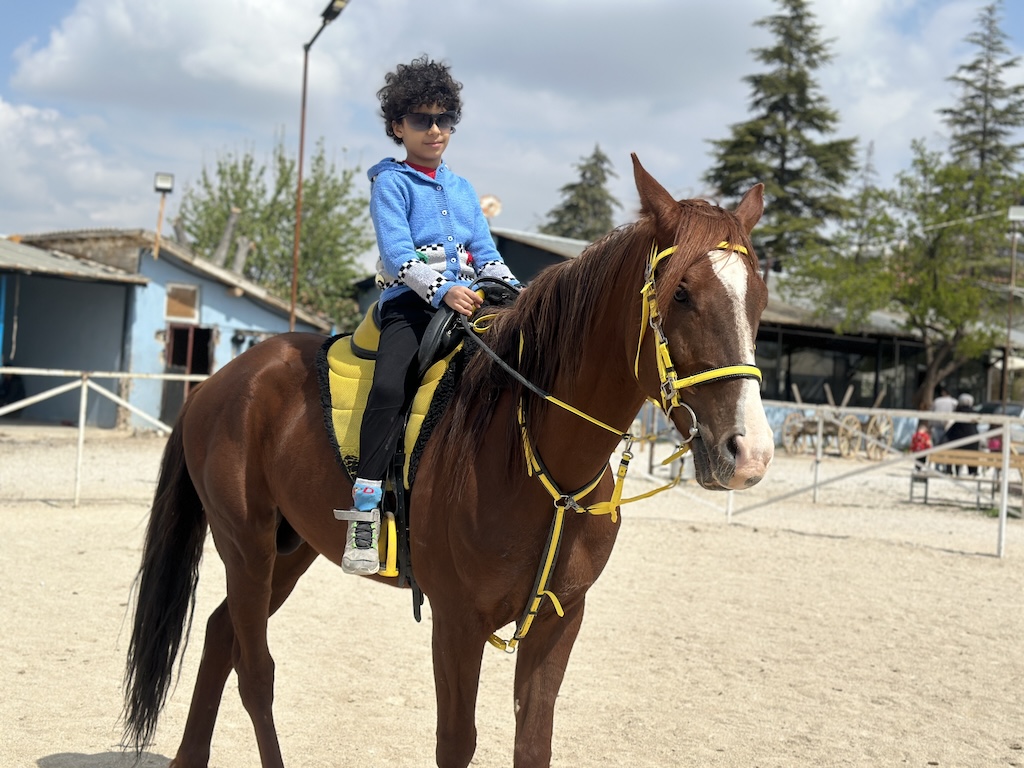
From Broken to Balanced: How My Horse Kuzey Healed Me, My Son Mo(And How Horses Can Heal You Too)
Nov 01, 2025
A Father’s Cry in the Middle of Nowhere
I didn’t come to horses for fun. I didn’t ride because it looked “cool.” I rode because I was drowning.
Alone in a foreign country, Turkey, far from everything familiar. My marriage had turned into a prison. Years of silence, resentment, and emotional neglect had hollowed me out. I felt invisible, broken, like a ghost walking through my own life.
Then came Kuzey.
Not just a horse. Not just an animal. A lifeline.
When I first met him, he wasn’t perfect. He was nervous, cautious, unsure of humans. A skinny horse, suffering from neglect by an owner who had no idea how to ride or manage horses. He’d been in his stall for months, alone, waiting.
But something about him… he saw me.
Not the man I pretended to be.
Not the one who smiled at parties while screaming inside.
He saw the pain.
And instead of running away, he stayed. He listened.
That moment changed everything.
I thought I was saving him from neglect.
But the truth?
He was saving my life, and my son’s.
Step 1: Healing Isn’t a Miracle , It’s a Routine. It’s a Discipline.
Let me be clear: healing isn’t magic. It doesn’t happen when you hop on a horse and suddenly feel “free.”
Healing happens when you show up, day after day, with your heart open.
For me, it started with simple things:
- Grooming Kuzey every chance I get.
- Walking him around the stable or in the nearby mountains.
- Sitting beside him in silence, no riding, no pressure.
- Ground exercises to rebuild his strength after months of neglect.
- Lunging him regularly to help him regain muscle and confidence.
It wasn’t about training.
It was about presence.
"Horses don’t care if you’re rich, famous, or successful. They only care if you’re real."
In that quiet time, I stopped pretending.
I cried.
I screamed into the wind.
I apologized, not to anyone else, but to myself.
And Kuzey?
He never judged.
He just stood there.
His breath calm.
His eyes steady.
Like saying: "You’re not alone."
That’s how healing begins.
Your First Step? Show Up.
Your horse is waiting for you.
And your care matters.
- Spend 15 minutes with your horse daily, just walking or even talking, yes talk to your horse.
- No phone. No music. Just you and the horse.
- Let him see your face. Let him hear your voice. Let him know you’re not hiding anymore.
- Ground exercise is the best, as it forms a bond between you and the horse you train!
This isn’t therapy.
It’s truth-telling.
Step 2: The Real Power of Horses Is Their Honesty
Here’s the thing most people don’t get:
Horses are the only animals that tell you the truth.
They don’t lie.
If you’re stressed, they feel it.
If you’re angry, they react.
If you’re afraid, they freeze.
No games. No excuses.
When I was still trapped in my old life, I’d ride Kuzey with clenched fists, tense shoulders, and a mind full of chaos. He’d resist.
Not because he was “bad”, because I was broken.
He was mirroring me.
One day, I finally realized:
"My horse isn’t refusing me. He’s reflecting me."
That’s when the shift began.
I started asking myself:
- Am I present?
- Am I consistent?
- Am I listening?
Not just to the horse, but to my own soul.
Horses teach us humility.
They demand we face our inner selves.
And in doing so, we grow.
Step 3: Horses Don’t Just Heal Us , They Heal Our Kids Too
This is where my story gets even deeper.
My son, Mo, was only 3 years old when he first met Kuzey.
His mother? She tried to scare him.
“Horses are dangerous!”
“They can kick!”
“They’ll hurt you!”

To be honest, many believe all animals are dangerous.
I didn’t want to believe it at first, but I’ve seen it firsthand.
But Mo looked at Kuzey, and smiled.
He reached out. Slowly. Tentatively.
And Kuzey lowered his head. Nickered softly.
And let Mo touch his nose.
From that moment, Mo loved horses.
Not because he was fearless, but because he trusted me, and I trusted Kuzey.
Now, at 9, Mo rides regularly.
He’s not perfect. He falls. He cries.
But he gets back up.
And every time he does, he learns something powerful:
- That failure is okay.
- That courage isn’t the absence of fear, it’s moving forward anyway.
We’ve built a routine together:
- Every Saturday, we ride.
- Before every ride: “How do you feel today?”
- Afterward: we journal, “What did you learn?”
Mo now says:
“Dad, horses teach me how to be brave.”
And he’s right.
Why Horses Are the Ultimate Teachers for Kids (And Adults)
Let me break it down simply:
1- Smooth Communication
Beyond emotion, horses teach profound lessons in empathy and listening.
They don’t communicate through words, but through subtle shifts in body language, tone, and intention.
A child learns that true communication isn’t about shouting commands.
It’s about understanding what the horse is trying to express.
Whether it’s fear in the way the horse holds its head, curiosity in the tilt of its ear, or trust in the softness of its eyes, kids learn to listen with their whole being.
This deepens their capacity for empathy, not just toward animals, but toward people too.
2- Responsibility

Responsibility is one of the most transformative lessons horses offer.
Caring for a horse requires consistent action: feeding, grooming, cleaning stalls, checking hooves, ensuring proper turnout.
These aren’t chores.
They’re acts of connection and commitment.
When a child sees that their horse’s well-being directly depends on their effort, responsibility becomes real and meaningful.
There’s no room for excuses.
If the horse is hungry, the child knows they failed to act.
This hands-on accountability builds character, maturity, and integrity.
3- Resilience

Resilience is another core lesson.
Horses don’t judge failure.
They don’t hold grudges.
If a child falls off, gets scared, or makes a mistake, the horse is still there. Waiting. Patient. Ready to try again.
This teaches a vital truth:
Courage isn’t the absence of fear, it’s showing up anyway.
Kids learn that setbacks are part of the journey, not signs of weakness.
With each attempt, they grow stronger, more confident, and more willing to face challenges.
4- Discipline Without Fear
Finally, horses teach discipline without fear.
They thrive on consistency, clarity, and structure, not punishment or force.
A good rider leads with calm strength, clear cues, and patience.
Children quickly learn that true control comes from skill, not intimidation.
When they see how a horse responds positively to gentle, consistent guidance, they understand:
Leadership isn’t about dominance, it’s about building trust.
This form of discipline fosters confidence, self-control, and respect, all without shame or guilt.
These aren’t lessons from a textbook.
These are lessons from life.
And they’re happening in real time, in the barn, on the trail, in the quiet moments between breaths.
How to Choose the Right Farm or Club (The Truth No One Tells You)
I’ve seen too many good hearts destroyed by bad stables.
Some farms treat horses like machines.
Others sell dreams to desperate riders.
And some trainers? They’re not teachers, they’re gatekeepers.
So how do you find the right place?
Ask these 5 questions before you sign anything:
Is the stable run by someone who loves horses, or just money?
Look at the horses. Are they clean? Calm? Happy? Or stressed, thin, isolated?Do they offer education?
A good farm teaches. They host workshops, share resources, answer questions.
If they say, “Just ride,” walk away.Is there a vet on call?
Ask: “How fast can you reach the nearest equine hospital?”
“Who handles emergencies?”
A real stable prepares for crises, not just profits.Do they respect boundaries?
A good trainer won’t push you to ride when you’re not ready.
They’ll say: “Take your time. We’ll go slow.”Are kids involved?
If a farm has programs for children, it likely values connection, not just performance.
💡 Pro Tip: Visit during feeding time. Watch how the staff interact with the horses. Are they gentle? Patient? Or rushed?
The way they treat the animals tells you everything.
I wrote a guide for horse owners, riders to understand how to choose the right farm for their horses and riding practice, you can read it here.
What Horses Can Teach You (Beyond Riding)
If you think horses are just for riding, you’re missing the point.
They teach us:
- To trust, even when we’re scared.
- To lead with love, not control.
- To live in the moment, because horses only exist in the now.
- To keep promises, because a horse remembers every kind gesture.
- To heal quietly, because sometimes, the deepest healing happens in silence.
I made a promise to my son:
I would never sell Kuzey.
Not for money.
Not for convenience.
Not for ego.
Because he saved me.
And now, he saves others.
Final Thought: You Don’t Need a Perfect Life to Ride a Horse
You don’t need money.
You don’t need experience.
You don’t even need a stable.
All you need is:
- A willingness to show up.
- A heart open to change.
- A horse who’s willing to meet you halfway.
If you’re hurting, if you feel lost, alone, or broken, go to a horse.
Sit beside him. Breathe.
Let him look into your eyes.
And let him remind you:
You are not alone.
This book is about that.
Written for my son. For the boy who smiled at a horse despite being told to fear it.
For every person who’s ever felt broken.
For the horses, those silent, wise souls, who carry us when we can’t carry ourselves.
Come as you are.
Show up.
And let the journey begin.
With hope,
Dr. Hamza Mousa
Founder, The Promise
Rider. Father. Healer.
Read the Full Book Here: https://hamzamu.gumroad.com/l/thepromisebook